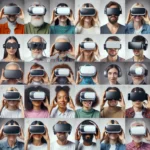The Relationship Between Video Games and Anxiety
There is a growing concern about the impact of video games on mental health, particularly the relationship between video games and anxiety. Research has shown that excessive gaming can lead to increased levels of anxiety, especially in individuals who are prone to mental health issues. The immersive and often intense nature of video games can trigger stress and anxiety responses in some players.
One aspect to consider is the role of competition and in-game challenges. While competition can be a source of fun and motivation, it can also create a constant sense of pressure and anxiety, especially in highly competitive gaming environments. Additionally, the addictive nature of some video games can lead to obsessive behaviors, further exacerbating anxiety levels.
However, it’s important to note that not all gaming experiences lead to negative outcomes. In fact, some video games have been designed to promote relaxation and stress relief. These games often incorporate soothing visuals, calming music, and mindfulness elements, providing players with a reprieve from daily stressors.
As researchers continue to delve into the relationship between video games and anxiety, it is crucial for individuals to be mindful of their gaming habits and seek help if they experience any negative effects on their mental health.
How Gaming Addiction Affects Depression
Gaming addiction can have a significant impact on mental health, particularly in relation to depression. The immersive nature of gaming, with its reward systems and sense of achievement, can provide an escape from real-life problems, making it a coping mechanism for some individuals. However, excessive gaming can lead to social isolation, lack of physical activity, and disrupted sleep patterns, all of which are risk factors for depression.
Moreover, the constant stimulation and excitement in gaming can desensitize the brain’s reward system, leading to decreased sensitivity to everyday pleasures and contributing to anhedonia, a common symptom of depression. This can create a vicious cycle where individuals turn to gaming for temporary relief, only to experience exacerbated feelings of emptiness and low mood afterwards.
Research has shown that gaming addiction and depression often co-occur, and the relationship between the two is complex. While gaming can exacerbate depressive symptoms, it can also be a way for individuals to cope with pre-existing depression. Recognizing the signs of gaming addiction and its impact on mental health is crucial in providing appropriate support and intervention for those at risk.
By understanding the connection between gaming addiction and depression, mental health professionals can develop targeted strategies to address both issues effectively, promoting a balanced approach to gaming and overall well-being.
Improving Mental Health Through Mindful Gaming
Improving mental health through mindful gaming has become a topic of increasing interest in recent years. With the rising popularity of video games, researchers and mental health professionals are exploring how gaming can have a positive impact on mental well-being.
Mindful gaming refers to the practice of using video games to enhance awareness, attention, and emotional regulation. This approach involves selecting games that promote relaxation, focus, and positive emotions, allowing players to engage in an immersive experience that can have therapeutic benefits.
Studies have shown that certain types of games, such as puzzle games, adventure games, and virtual reality experiences, can help reduce stress and anxiety, improve cognitive function, and provide a sense of accomplishment. By encouraging players to be present in the moment and to engage in enjoyable and challenging activities, mindful gaming can contribute to overall mental wellness.
Furthermore, the social aspects of gaming, such as online multiplayer games and gaming communities, can provide individuals with a sense of belonging and social support, which are crucial for mental health. Connecting with like-minded individuals and forming friendships through gaming can help combat feelings of isolation and loneliness.
As the research on mindful gaming continues to evolve, it is essential to recognize its potential as a tool for improving mental health. By harnessing the therapeutic aspects of gaming, individuals can incorporate mindfulness and relaxation into their daily routines, ultimately enhancing their overall well-being.



